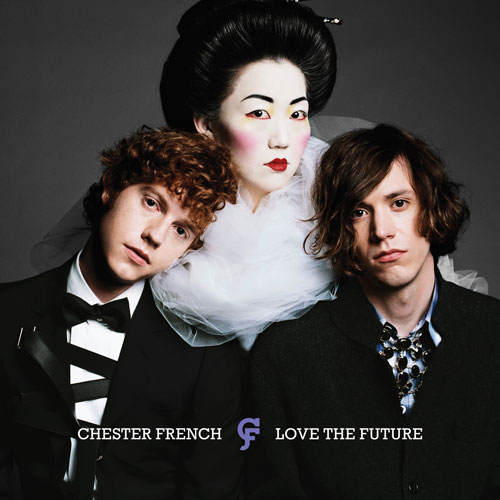 In all likelihood you've already heard their breakout hit She Loves Everybody or have seen the condom-wrapper packaging for their first single. D.A. Wallach and Max Drummey, the boys of indie pop-rock band Chester French, sure like to get crafty with the trimmings. But beyond all the fun, futzy stuff is a band that makes really good indie pop-rock music. And they like to get fun with questions, too, much to my own enjoyment: enjoy this interview.
In all likelihood you've already heard their breakout hit She Loves Everybody or have seen the condom-wrapper packaging for their first single. D.A. Wallach and Max Drummey, the boys of indie pop-rock band Chester French, sure like to get crafty with the trimmings. But beyond all the fun, futzy stuff is a band that makes really good indie pop-rock music. And they like to get fun with questions, too, much to my own enjoyment: enjoy this interview.Tell me a story. Any story.
D.A. WALLACH: I just took a shower and cut myself shaving.
MAX DRUMMEY: I just cleaned blood off of D.A.
What’s your philosophy for music? For life?
DW: Have fun, have integrity, make a positive impact.
MD: Make art. Don't be mean.
What was the aesthetic behind the sound of your album Love the Future?
DW: I don't think we set out with a clear aesthetic we were trying to achieve, but one definitely crept in as a result of our influences, the studio at college where we recorded most of the record, our naivete. I think it sort of sounds like we're young.
MD: It was the first time I had made pop songs without a predetermined instrumentation. That kept the project open ended.
What were some of your biggest inspirations (musically, literarily, and otherwise) for this particular album?
DW: We took a lot of cues from 60's pop on one hand and 90's hip-hop on the other.
MD: Godsmack.
Where is your favorite place in the world to play and why?
DW: We've had a lot of fun playing in Detroit, but we enjoy lots of different crowds. We just had one of the best shows ever in Iowa yesterday, right near Omaha.
MD: The studio. You can do it again if you fuck up.
How did you meet? I mean, I know you met at Harvard, but how and why did you decide to make music together?
DW: We were both looking to be in a band and we identified with comedy.
MD: I had a dream about starting a band with orphan Annie.
How was it, making music at Harvard, in that particular environment?
DW: It was fine. You're surrounded by very highly motivated people, so it's hard to not catch that same sense of urgency and push yourself.
Do you prefer it to the way you work now or vice versa (or is there even a significant difference between your process then and your process now)?
DW: It's nice that we now don't have class to contend with at the same time. However, now we have lots of other stuff to do that takes up our time and makes it difficult to write and record.
I heard you initially wanted to name the band Marilyn Manson so what made you decide “Actually let’s name ourselves after sculptor Daniel Chester French”?
DW: We just thought the name was cool and distinctive.
Did the condom-style packaging of She Loves Everybody piss people off? Or what were some especially interesting reactions?
DW: It got great reactions and people remember it. You're asking about it a year late. ;)
Abstractly, which is better: to confuse people or to piss them off? If you were to choose to do exactly one of those things with your music, which would it be?
DW: I think I would choose to confuse, because I don't ever intend to piss people off.
MD: In what context? With art, it's sort of out of your control. Interpersonally, I prefer not to piss people off.
It’s been said you “get belligerent when the subject of indie rock is raised”—this is a direct quote, mind you—so what about the subject do you find so irksome?
DW: I used to be threatened by that scene because we didn't have many fans and I felt as if lots of esoteric, arbitrary music was getting appreciation that we deserved. That was immature, though, and I don't hold any band accountable for the critics who support it.
MD: I like a lot of indie rock bands. That's D.A.'s beef.
After all the dissecting you have done of iconic music, have you managed to distill a songwriting formula or pattern that at least works for you?
DW: I think we've converged upon some general tricks, but nothing like a formula. We try to balance familiarity with surprise.
MD: I prefer to always keep moving, learning from different sources, and trying new things.
Your music quite clearly isn’t hip-hop, so why and how do you try to ape the production of skilled hip-hop music?
DW: Music is music. We don't believe is any sort of concrete boundaries between styles of songwriting or production. We've learned from hip-hop producers just as we've learned from jazz or rock producers we love.
How have the sorts of sounds and songs you are working on now changed or developed from those on your album?
DW: They're a little harder and more beat-driven.
MD: They have better drums and bigger sounds.
For more about Chester French and their music, check out their website or their MySpace.
No comments:
Post a Comment